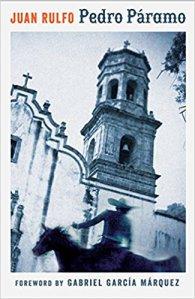Pedro Páramo, by Juan Rulfo and translated by Margaret Sayers Peden (first published 1955)
Pedro Páramo comes in at around 140 or 150 pages, depending on the edition you read. It’s a slim novel that you could easily read in an afternoon. It’s an extraordinary work that I have no hope of doing justice to.

I came to Comala because I had been told that my father, a man named Pedro Páramo, lived there.
The “I” in that quote is Juan Preciado. He promised his mother on her deathbed that he’d seek out his father whom he’s never met. He’s far too late. Comala is deserted. Nothing remains but empty buildings, dust and the voices of its dead.
This is not a naturalistic novel. Juan meets people he believes to be living but discovers to be ghosts. He hears the voices of other less tangible ghosts – the village is filled with them. His narrative starts to be replaced (and by midway is entirely replaced) with the memories still haunting Comala.
Those voices combine to create a history both of Pedro Páramo and Comala. The two can’t be separated. Páramo was Comala’s largest landowner, its most important son and father to many of its children (most of them illegitimate). He was the village’s temporal god and as such was worshipped more by the villagers than by the Catholic god they were supposed to follow.
The language is extraordinary, often beautiful.
Water dripping from the roof tiles was forming a hole in the sand of the patio. Plink! Plink! and then another plink! as drops struck a bobbing, dancing laurel leaf caught in a crack between the adobe bricks. The storm had passed. Now an intermittent breeze shook the branches of the pomegranate tree, loosing showers of heavy rain, spattering the ground with gleaming drops that dulled as they sank into the earth.
Rulfo plays tricks with the reader. At one point I couldn’t quite work out how the narrative fitted Juan’s situation, then suddenly I realised that I wasn’t reading Juan’s thoughts any more but someone else’s – perhaps overheard by Juan as he tried to sleep in this ghost-ridden place. The reader is unsettled, forced to reassess and made to engage with the text in order to understand it.
The need to engage is part of what makes this such a tremendous novel. It’s not actually particularly hard to read, but you have to think about what’s happening and how things fit together. Eventually it all makes sense but you have to trust Rulfo that it will and along the way he creates something which though slim is nonetheless epic. As I write this I can feel the heat and dust of Comala. The book stays with you.
Comala is as much a spiritual desert as a physical one. The dead flock the town because they were denied absolution in life. Being at least nominal Catholics they hoped in life that heaven would be their reward, but they put their faith in Páramo and so what they get instead is an eternity of Comala. They remain as witnesses to Páramo’s tragedy.
Frustrated hope is a running thread here: Juan’s mother sends him to find his father, but Páramo is already dead; Páramo’s tale is in part a love story of his passion for a girl he loved in childhood who years later returned to the village, but she’s mad and he’s perpetually unfaithful to her; Father Renteria dreams of standing up to Páramo but instead takes his gold and becomes so compromised that he can neither grant absolution nor receive it.
As elements of the history swirl together we see murder, rape, land theft, the Mexican revolution, many lives and many deaths. It’s remarkable how much is packed in here and yet somehow Rulfo takes all this quite solid underlying incident and yet makes something mythic from it. You could, and people have, write whole essays about this book but I doubt you’d ever quite capture it.
I consciously don’t use the word masterpiece often on this blog. It’s too easily overplayed and therefore diminished. Here I have no hesitation. Pedro Páramo is a masterpiece. It is a landmark of literature. For all that, it isn’t forbidding and it requires no prior scholarship or knowledge of Mexican history or geography. All you need is the £8.99 price of admission.
Filed under: Mexican fiction, Rulfo, Juan, Spanish Tagged: Juan Rulfo

